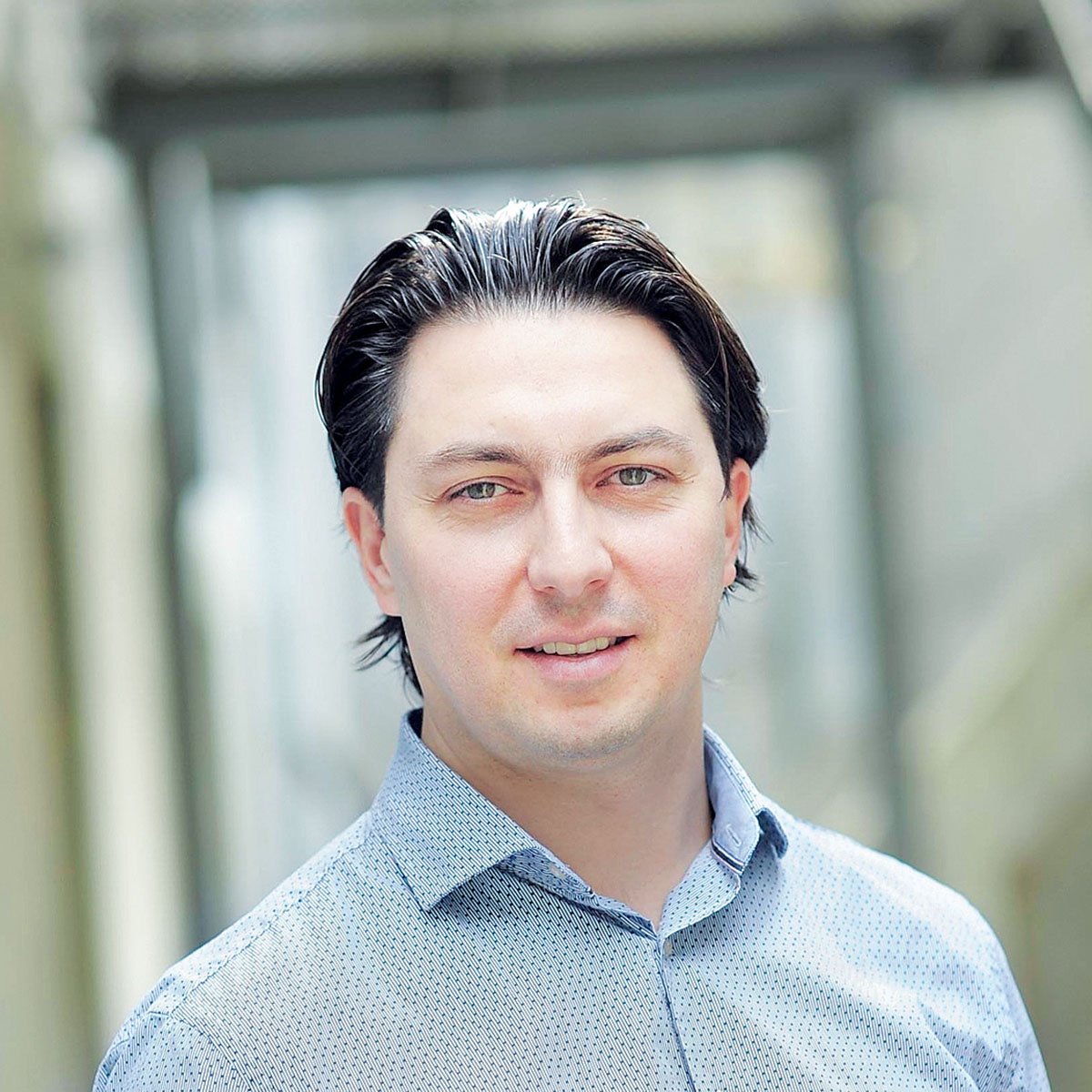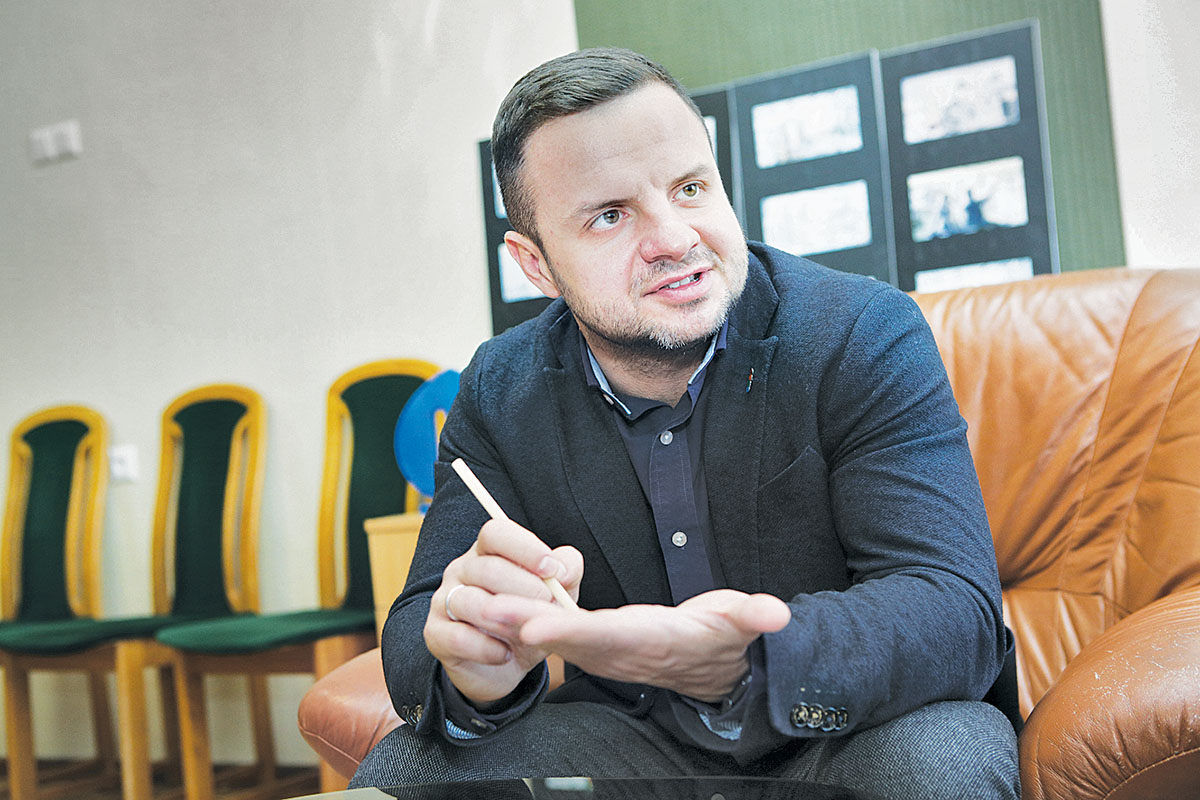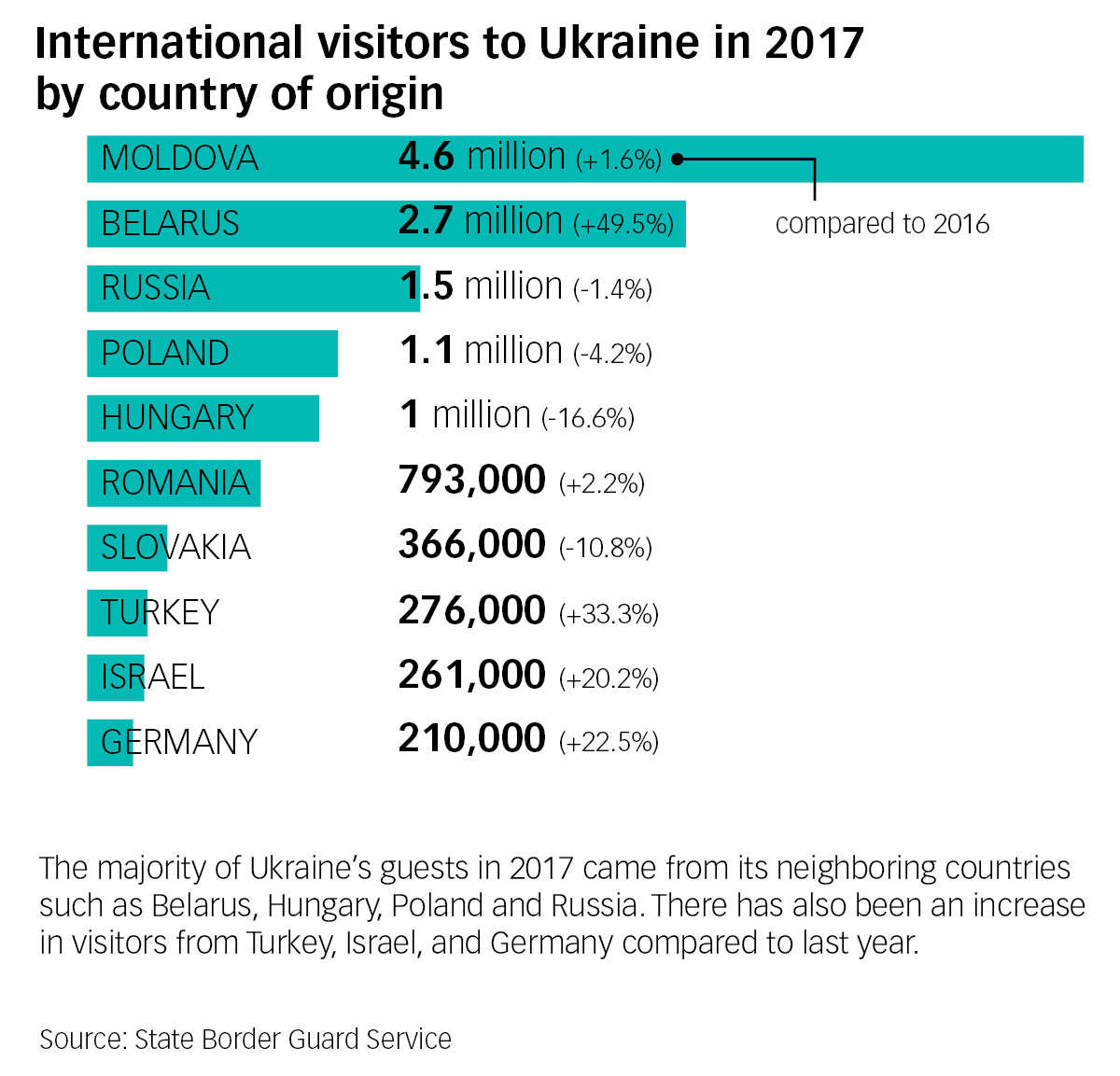War, political scandals and economic instability have challenged every sector of Ukraine’s economy. Tourism is no exception. So despite its beautiful scenery, rich history and low prices, Ukraine is still a hard sell, particularly as there are more developed hotspots, such as Turkey and Greece nearby.
Nevertheless, there are Ukrainians whose daily job it is to counter the country’s negative image, and bring badly needed tourist dollars to the country. The Kyiv Post talked to two of them.
Unknown country
Ivan Liptuga has been working in tourism all his career. After serving as the head of the tourism and resorts department of the Economy Ministry, in 2017 he took charge of the newly created non-governmental National Tourism Organization.
Almost 12.5 million foreigners came to Ukraine in 2017, according to the World Economic Forum Travel and Tourism Competitiveness Index, in which Ukraine was 88th out of 136 countries in 2017.
The Ukrainian Border Service, meanwhile, estimates that around 14.4 million foreigners came to the country last year. These numbers are still smaller compared to neighboring countries like Poland, Hungary, and Russia. “Those who come to us are our neighbors,” Liptuga told the Kyiv Post.
There are Moldovans, Belarusians, Russians, and Poles, he said. With foreign visitor numbers low, Ukraine’s tourism sector is mainly internally driven — 80 percent of tourist trips are made by Ukrainians. “In general, Ukraine is unknown,” Liptuga said. “All of the foreigners who come to us ask only one question — why is it that the only time we hear about you is when you have a natural or political disaster?”
Marketing strategy
One reason that Ukraine is still undiscovered as a tourist destination is that it has lacked a systematic marketing strategy. The country doesn’t yet provide a comprehensive all-inclusive service, offering the customer a full package — everything from excellent transportation, to accommodation, catering and special tourist routes.
In that regard, Ukraine’s Black Sea neighbor Turkey has done a lot better, Liptuga said. For a country to create a good impression, tourists have to be satisfied with service.
Dishonest taxi drivers and crumbling infrastructure, on the other hand, damage a country’s image. Ukraine’s underdeveloped business culture also makes it difficult to offer advanced tourism packages.
For instance, the country’s seaside resorts are reluctant to provide discounts for early-bird bookings.
“We’re lacking a business culture in which we all understand how tourism affects the country’s development,” Liptuga said.
While most Westerners have been able to travel to Ukraine without needing visas for more than a decade, citizens from Asian nations requiring visas still face costly and time-consuming hurdles.
The Foreign Ministry has, however, promised to increase the number of online and on-arrival visas it issues, and reduce their price to $65.
Now visas cost up to $170.

Ivan Liptuga, head of nongovernmental National Tourism Organization. (Ivan Liptuga/facebook) ((Ivan Liptuga/ facebook))
Finding a niche
“Tourism can be a consolidator, a business development flagship for each city,” Liptuga said.
The task is to find a particularly interesting sight that will attract visitors.
Some of the attractions can be surprising. For example, in industrial cities like Zaporizhzhya, and Kryvyi Rih in Dnipropetrovsk Oblast, even ore production and mining sites can be turned into tourist destinations.
For example, the Rodina mine in Kryvyi Rih offers visitors trips underground to a depth of one kilometer. “It’s such a great experience,” Liptuga said.
Other tourists want to see how ore is turned into steel, or how helicopter engines are made at Ukraine’s Motor Sich automotive company.
“Foreigners are very interested in such things, because this is our Soviet heritage,” Liptuga said. In contrast, visitors from Central Asia tend to visit Ukraine’s western cities, such as Truskavets and Morshyn in Lviv Oblast, to drink the mineral waters at spa resorts in the Carpathian Mountains. These attractions were developed back in Soviet times.
While some spa resorts — such as the Mirotel Resort and Spa, and the Spa Resort Rixos Prykarpattya in Truskavets — are being built or modernized, that makes them expensive. “Those are modern, though not all Ukrainians can afford them,” Liptuga said.
“But such places should still be opened throughout the country, as we have natural resources.” As Ukraine has an unsavory reputation as being a country offering sex services, Liptuga said his team is doing all it can to change the image and stop such promotions.
Instead, they are looking to promote local cuisine, food production and other, more wholesome advantages. His organization has designated 2018 the year of “gastro-tourism” in Ukraine.
The plan is to show off local producers, beekeepers, farmers and wineries to foreign visitors.
“There’s no place in Europe where you can have such delicious food,” not to mention cheap as well, he said.

Anton Taranenko, the head of the tourism and promotion department of Kyiv City Administration. (Kostyantyn Chernichkin)
What about Kyiv?
Anton Taranenko wears a jacket with a colorful pin reading “Kyiv.” He is the head of Kyiv City Administration’s tourism and promotion department.
According to Taranenko, the fact that Ukraine has hosted events such as Eurovision shows that the tourism sector is developing. “It shows that the country is open,” Taranenko said. Despite Russia’s war, Ukraine’s capital is a tourist destination.
Around 1.55 million foreign tourists visited Kyiv in 2017, mostly from Belarus, Israel and the United States — 22 percent up from the previous year.
Even so, that’s less than the city’s record year of 2013, when 1.8 million tourists visited Kyiv. To attract more tourists, Taranenko said the city should invest in advertising, improve logistics and transport and clean up its public spaces.
When he started his job in 2015, Taranenko’s department was part of a bigger unit in the city administration and had an annual budget of only $18,800. The city council has since made the department administratively independent and increased its financing to $1.9 million in 2018.
However, the department has got only 20 percent of the money it expected to get this year. Being separated off from the city administration has partly eliminated some bureaucracy, Taranenko said.
“When you’re independent, you have more responsibilities, but also the ability to do everything more quickly,” he said.
Things to be fixed
Taranenko’s department surveyed foreign and local tourists about the level of service in hotels, restaurants and the general hospitality of locals.
Kyiv’s cleanliness received the lowest score from foreigners — only 2.8 out of a possible 5 points. “Foreign tourists are more demanding,” Taranenko said.
But untidiness in the city is not the only problem.
Tourists also say it’s difficult to find one’s way around Kyiv. To improve this, Kyiv should set up a central tourist information center where visitors can get information, Taranenko said.
“If we want to make revenue from tourism like every other country, we have to invest in it first,” he said.
His survey also shows that foreign tourists avoid using public transport, preferring taxis and rented cars. It would help if more bus drivers and metro workers learned basic English. “Our metro isn’t among the most (tourist-friendly) ones,” he said.
“You can get lost in Maidan Nezalezhnosti station.” Typically, tourists come to Kyiv for 2–3 days and then go on to other big cities like Lviv, Kharkiv, Odesa and Dnipro.
They usually stay in hotels, which boosts the city’s budget via the tourist tax (1 percent of room price). That raised Hr 25 million — almost $1 million — from the capital’s hotels in 2017, meaning revenue approached $100 million.
To improve the numbers, Ukraine should allow tourists coming from distant countries such as India and China to get electronic visas, or visas on arrival, Taranenko said.
Ideally, foreigners should be able to have a visa-free stopover option if they are staying only up to 96 hours, such as the one Ukrainians have when they travel through Singapore, he said. Taranenko’s next goal is to make a success of Kyiv’s hosting of the 2018 UEFA Champions League Final — the match is to be played at the capital’s Olympic Stadium at the end of May.
Big events like this are a great way to attract more tourists, Taranenko said. He’s confident he can make sure the big match boosts tourism in the capital further. “I’m not claiming to be a super specialist in tourism, but I’m very good at organizing events,” he said.

